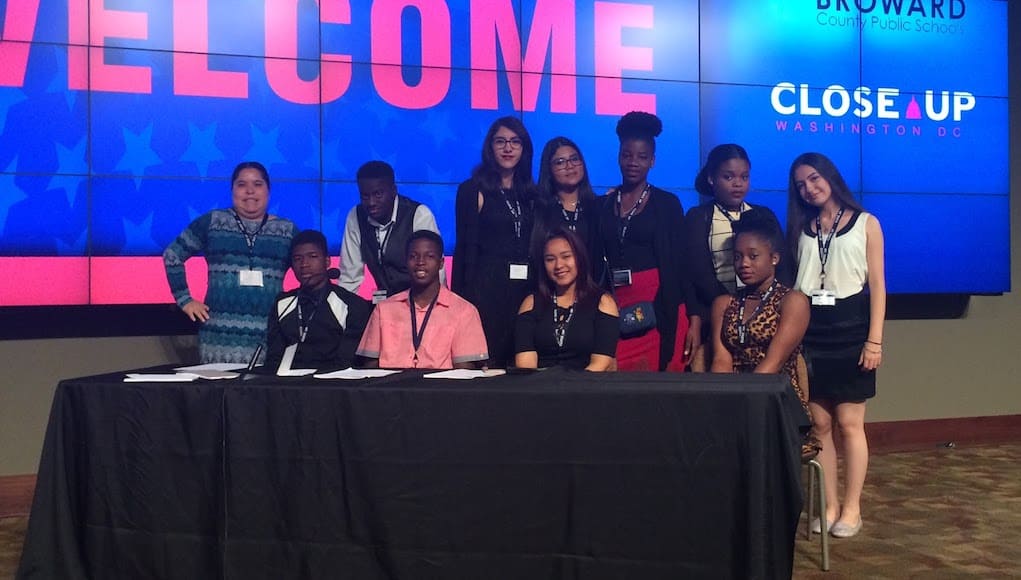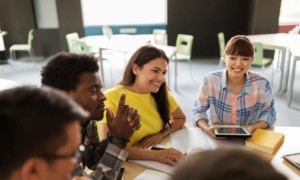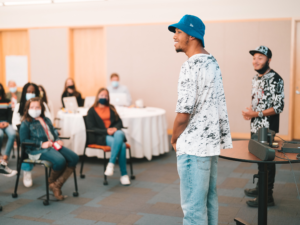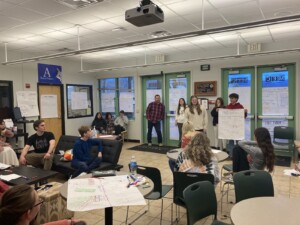In Broward County, Student Voice Impacts the Classroom and Beyond

Over the past several weeks, the world has witnessed the grieving students of Marjory Stoneman Douglas High School question legislators, advocate for action, and galvanize support for a national social movement. With poise and composure, these students have seemed prepared to articulate a message with a voice and perspective that has been absent from public discourse prior to their personal and collective tragedy. And within a matter of days, thousands have answered their calls and planned marches in the streets, donated to organizations, and pushed legislation forward. Public policy experts, award-winning journalists, and a myriad of anonymous voices on social media have marveled at these students. As a parent of students in Broward County Public Schools, of which Marjory Stoneman Douglas is part, I have watched in awe as they have channeled their pain into creating dialogue and action. I, and many others, have asked how these students were so primed to respond to these life circumstances.
Some of the students, themselves, have been clear in attributing their preparedness to their educational experiences. They have noted an array of educational courses and activities that have given them opportunities to consider, research, articulate, and defend issues and causes. In examining the culture of Broward County Schools, it is clear that the development of student voice is a top district priority and a common thread throughout various academic and extracurricular programs.
Broward’s emphasis on student voice ties together many 21st-century learning goals: it builds communication skills, often requires collaboration among students, and forces students to think critically and creatively about problems and solutions. Further, it empowers students to have agency in their education, life outcomes, and broader communities. Broward has district-wide programs that encourage courageous conversations about race and social justice, has the largest Debate program in the country (including a team at a juvenile justice facility), and provides structured ways to promote student activism and engagement in legislative affairs. While the Marjory Stoneman Douglas students are absolutely exceptional, their acumen in productively using their voice is a standard goal for all students in Broward County Schools.
The Largest Debate Program in the Country
Participation in Speech and Debate requires students to research issues, construct logical arguments, organize ideas, understand rhetoric, assess their audience, build confidence, and engage in action-oriented conversations about world events. Susie Cantrick, Director of Applied Learning for Broward County Schools, explained that Debate teaches kids to “defend a point of view and be able to speak to it in a logical and articulate manner. In short, it allows students to find their voice and understand how to use it.” Justin Weaver, Instructional Specialist, noted that not only does Debate teach you to defend your point of view, “but it forces you, at times, to defend a view that you might not hold, teaching you to consider other perspectives.” This is a skill that is particularly fundamental in making progress or finding points of compromise on divisive political or social issues.

Broward County has also overcome the stereotype that Speech and Debate is for a top echelon of high-performing, affluent students; rather, it has made Debate participation an activity for all students. In Broward, Debate is offered in all high schools and middle schools, and thirty-two of the District’s elementary schools. Nearly 12,000 students, encompassing the full spectrum of the diverse county, participate in the debate program. Fifty-six percent of Broward County School’s debaters are female, nearly a third of participants are African American, and more than a third are Hispanic.

Broward’s Debate Initiative has ensured that any student who wants to participate in the program can do so regardless of economic means. Between District funding and money raised from community partnerships, Broward is able to provide free transportation to and from tournaments, has eliminated most tournament entry fees, and runs a clothing bank so students can access professional attire for competitions. In Broward, nearly half of Debate participants are on free and reduced lunch. The District has constructed Debate courses that have replaced remedial reading courses, giving students opportunities to strengthen reading skills through studying multiple perspectives, developing their voice, and applying their learning through engagement with their peers. This coming year, The National Speech and Debate Association will have its 2018 national tournament in Fort Lauderdale from June 17-22, 2018.
Juvenile Justice Debate Program
Broward has even extended inclusion in its Speech and Debate Program to those students who would seem the most voiceless: incarcerated students. Last year, the Broward Debate Initiative partnered with a local Juvenile Justice Youth Treatment Center to create a weekly Debate class. The purpose of the program is to give the students the tools to use words and communication to productively engage as citizens by constructively arguing and defending different positions. Megan West, Curriculum Supervisor and one of the organizers of the program, explained that “when these kids are first introduced to Debate and allowed to construct an argument, it is a transformative experience. They suddenly realize that they are allowed to have an opinion on something and that someone is going to listen to what they have to say.” They understand the power their voice can have.
Demonstrating the commitment to the equitable distribution of resources and inclusion of all students in the program, the Debate coach for these incarcerated students is Jesus Caro, also the Marjory Stoneman Douglas Debate teacher and coach. The students have competed as a Debate team at several tournaments and have won medals at tournaments against some of the nation’s top Debaters. Juanita Cook, a teacher at the Youth Treatment Center, explained that, after participating in the program, she has seen her students “hold their heads higher and communicate more effectively for their needs and wants.” Ms. Cook summed up that, for her students, the program is “relevant, empowering, and life-changing.”
Social Justice: Young Voices Matter
Many of us will remember that during the summer of 2016, a series of confrontations between young, primarily African-American citizens and law enforcement across the United States resulted in deaths and subsequent public demonstrations. Tensions in urban areas rose throughout the country between youth and police. In preparation for the 2016-17 school year, Broward Schools developed a systemic effort to enable students to speak with each other, and with law enforcement, in order to promote understanding and to channel a mutual distrust into productive dialogue. The efforts led to events at individual schools and regional gatherings. These experiences were jointly developed by a variety of district staff to address equity, academic attainment, diversity, and applied learning in conjunction with grassroots leaders and law enforcement personnel.
The respect for, and emphasis on, student perspective was clear with the initiative being named Young Voices Matter. As the program continues to adapt to include new socially significant issues, the District is making an effort not to shy away from hard conversations on race and other social issues. Rather, as Michaelle Pope, Executive Director of Student Support Initiatives for Broward Schools explained, “the District provides supportive environments and structured forums to hold discussions and take actions to promote social justice for the entire community.”
Civics With Immigrant Students
With over 191 languages from 204 countries represented in the over 35,000 students identified as English Language Learners, Broward Schools plays a significant role in preparing many immigrants for a life of citizenship and civic engagement. A partnership between the Broward Schools ESOL/Bilingual Department, Department of Legislative Affairs, and the Close Up! Foundation provides students with the opportunity to research, author, and advocate for policy changes at the local and state level. Participants work in intra- and inter-school teams to select, design, and present a legislative proposal on a societal issue that can be addressed with legal or policy-based action.

After presenting their proposals at a district-wide convention, many of them present to municipal and county legislators. A large contingent traveled to the state capital in Tallahassee to “Rally to Tally” for direct advocacy at the state level at the beginning of the annual legislative session. These students, most of them residents of the United States for only a few years, experience how citizens productively engage with different layers of government to turn words into actions; how voice can be a verb. Vicky Saldala, Director of Bilingual/ESOL for Broward County Schools, explained that “These programs teach ELLs and immigrant students that their voice counts in the community where they currently live. These are empowering experiences that engage them in being active members of their communities.”

Educating People Who Make a Difference Tomorrow and Today
Two years ago, in a video message describing the Social Justice: Young Voices Matter initiative, Broward County Public Schools Superintendent Robert Runcie described his intent to create space and “structure for our students’ young voices.” He explained that, as a District, “We want to enable our students to use this voice to understand, to listen, and to promote positive change in our community.” Like many school districts, Broward County has ambitions to educate students who can think critically about real-world issues, formulate arguments, communicate their thoughts, and participate in constructive and civil discourse. The words and actions of the Stoneman Douglas students are evidence that Broward County is well on its way to being successful in this mission–to promote positive change well beyond the local community.
Superintendent Runcie reflected on the power of having a systemic approach to promoting student voice at a CNN Town Hall one week after the shootings, saying, “In some ways it seems like we’ve been preparing our kids for this moment without realizing it.” Students in Broward County Schools understand that they have a voice. They know their voices matter. They realize they have agency in their own lives and in broader social, political, and economic conversations. They practice using their voice, defending their perspectives, and finding actionable steps to affect change on a daily basis. Educators often think that they are preparing their students to be successful in the future; in Broward, students have taken their lessons and have started positively changing the world today.
- 8 Things to Look for in a Student-Centered Learning Environment
- Fueling a Vision of Student-Centered, Personalized Learning through Student Voice
- What School Should Be: The Strength of Student Voice
Stay in-the-know with all things EdTech and innovations in learning by signing up to receive our weekly newsletter, Smart Update.






0 Comments
Leave a Comment
Your email address will not be published. All fields are required.